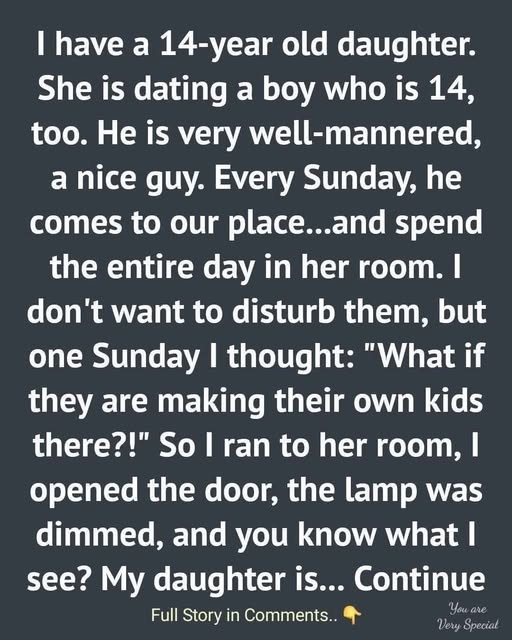I tried to be rational. I told myself they were doing homework. I told myself she deserved trust. I told myself to stop inventing disasters.
But silence from teenagers is the kind of silence that makes you walk down the hallway before you even realize you’re doing it.
I stood outside her door and listened. Nothing. Not even a whisper.
I knocked lightly.
Still nothing.
And that was the moment my inner “trusting parent” cracked a little. So I opened the door—not wide, just enough to see what I needed to see.
What I found almost made me laugh out loud from sheer relief.
They were sitting cross-legged on the carpet, surrounded by math books, broken pencils, erasers chewed down to nubs, and paper full of scribbled attempts at whatever equation they were torturing themselves with. She was explaining something with dramatic hand gestures like a tiny professor. He was staring at the book with the intense concentration of someone trying to hack into the universe.
Just two kids doing algebra.
Not kissing. Not experimenting. Not sneaking anything.
Just… algebra.
The untouched plate of cookies on her desk looked like evidence of innocence, glowing under the lamp like: Relax, woman.
My daughter looked up at me, puzzled. “Mom? You need something?”
Her question held zero guilt. Zero irritation. Just that amused teenager tone that says: Why are you being weird?
“I was just checking if you two wanted more snacks,” I said, trying to sound normal.
She raised an eyebrow, half-smiling. “We’re good, thanks.”
And that was it. I closed the door and walked back to the kitchen, feeling like my heart had been squeezed, shaken, and then handed back to me with a pat on the head. Relief flooded in, but so did something else—something that stung a little.
I realized I trust my daughter completely. But I don’t always trust the world around her. That’s the real battlefield of parenting teenagers. You’re not doubting their goodness. You’re doubting the thousand variables they collide with every day—impulse, persuasion, hormones, pressure, confusion, curiosity.
We remember our mistakes. We remember our close calls. They haven’t lived enough life yet to understand why we worry. So our past tries to write their future, and we try to stop it from doing that—while still protecting them.
Later that night, I walked past her room again. This time, I heard laughter—sharp, bright, unfiltered laughter. The kind only kids can produce before the world teaches them to tone it down. Something inside me softened. I realized trust wasn’t a single decision. It wasn’t a switch you flip. It was a muscle you keep choosing to use, even when it trembles. Even when your instincts scream to interfere.
After dinner, she washed dishes beside me. Out of nowhere, she said, “Mom, you don’t have to feel weird checking on us.”
It wasn’t defensive. It wasn’t annoyed. It was mature. Thoughtful. Strangely adult.
“I just want you safe,” I said.
“I know,” she replied quietly. “And I’m not going to put you in a position where you can’t trust me.”
I stood there watching her—this girl who used to sleep with stuffed animals and now speaks with the clarity of someone growing into her own skin. She didn’t need surveillance. She needed guidance. Steady, calm, present guidance. She didn’t need someone hovering. She needed someone who believed in her but was still close enough to catch her if she tripped.
That’s when it clicked.
She doesn’t need a warden. She needs a lighthouse.
Someone steady. Someone warm. Someone who lights the path without dragging her by the arm. Someone whose presence is felt, not forced.
Trust, I realized, is not absence. It’s not pretending danger doesn’t exist. It’s not handing over the wheel and praying. Trust is awareness without intrusion. Protection without suffocation. Love without control.
And that’s how she grows into herself. Not under a microscope, but in that space between freedom and guidance—where she knows the rules aren’t there to cage her, but to steady her.
So yes, I peeked behind the door. Not because I doubted who she is, but because motherhood is equal parts faith and caution. And what I found wasn’t danger.
It was reassurance.
Two kids doing math. Two hearts still young enough to choose algebra over temptation. A reminder that trust, when paired with boundaries, can actually work.
Our children don’t grow best under lock and key. They grow best when they’re seen, supported, and given room to rise—knowing we’re right there if they stumble. Not blocking the door.
Just keeping the light on.

